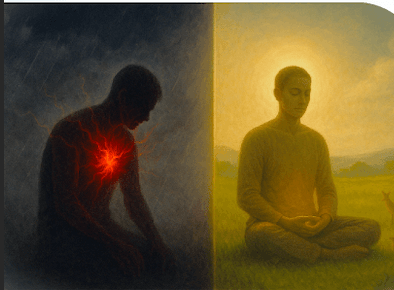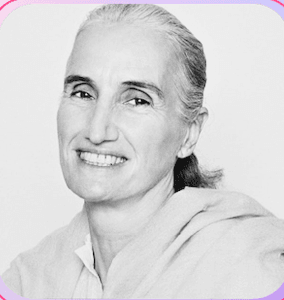
I was a very wild kid, brought up on a farm with a deep love for animals and nature. Yet, despite my affinity for a peaceful life, there was a persistent pattern of anger within me. It was a chronic state, an "anemia of the soul" as a friend and scientist once called it. This phrase really struck me and made me question my inner world. I began a journey inward, reflecting on my life to find the root of this weakness. I realized that for as long as I could remember, I had been fighting for justice. As a kid, as a youth, I was always defending someone, unable to stand for what I saw as unfairness. My anger, I discovered, was a habitual reaction to a world that didn't align with my ideals.
When I started my spiritual journey with Rajyoga meditation, I was non-vegetarian, but I had made an attempt at being vegetarian back in Argentina before giving up. The transition to a vegetarian diet felt very spontaneous and natural. One of my first teachers, a biochemical professional, posed a question that resonated deeply with me: "If you have a scale and you put a powerful mind on one side and eggs and meat on the other, what would you choose?" For me, the answer was clear. I chose the powerful mind. The principle of non-violence behind the diet also deeply appealed to me. As an animal lover, I felt a strong connection to this philosophy. I realized that if I wanted to be a peaceful person, my actions had to align with that goal, and consuming the flesh of an animal went against that. I didn't feel restricted. Instead, it was a conscious choice that aligned with my "higher purpose."
This shift in diet was just one part of my transformation. The more profound journey was to understand and overcome my anger. A book by one of our teachers, "Don't Get Mad, Get Wise," became a powerful tool. It taught me that anger isn't an inherent part of my nature; it's a learned behavior. I had to unlearn it. The book revealed that anger isn't just a loud reaction; it has many facets, including passive aggression, feeling victimized, and resenting a lack of acknowledgement. The common thread in all forms of anger is a sense of loss. We lose our peace, our happiness, and our sense of self.
We mistakenly believe anger gives us power, allowing us to control a situation or another person, but the opposite is true. Every time we get angry, we lose control of our own self. We think we can change the past or control things outside of ourselves by reacting with anger, but that's a false promise. The paradox is that the more we try to control others, the more we lose control of ourselves. This frustration, this loss of self, is the real price of anger. We harm ourselves deeply, leading to physical illnesses and emotional unhappiness.
I learned that the cause of anger isn't outside of me; it's inside. It's not the event itself, but my thoughts about the event that create the feeling. My teacher Mike George at Brahmakumaris taught me a simple yet profound concept: "Things happen for me, but they don't happen to me." For an insult to hurt me, I have to take it from outside and bring it inside my mind. By choosing not to think about it, I can prevent the feeling of being hurt. This was an incredibly liberating realization. It made me understand that I'm the one who needs to forgive myself for allowing that negative thought to take root. This is where meditation became so crucial. It helps us become observers of our own thoughts, allowing us to see the inner workings of our mind without reacting. Through this process, I've come to see anger as a habit I can change, not a part of who I am. I can't say I've overcome it completely, but I have come a long way. I am now on a path of responding with peace instead of reacting with anger, managing my inner self rather than trying to control others. My purpose is to regain my peace, and I now have the tools to do so.

BK Moira Lowe,
National Coordinator Brahma Kumaris, Argentina
The Anemia of the Soul




